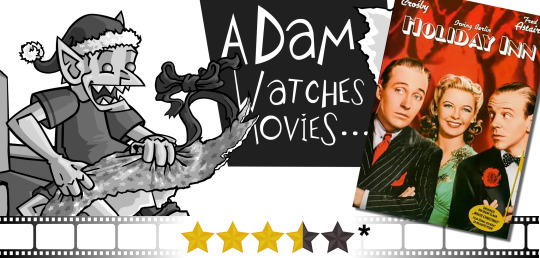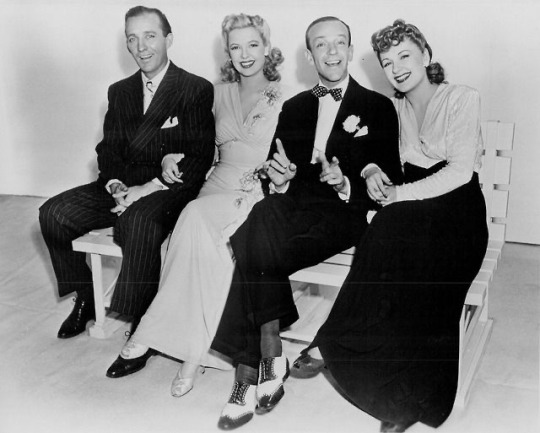#virginia dale
Explore tagged Tumblr posts
Text

Remembering Virginia Dale (July 1, 1917 – October 3, 1994)
14 notes
·
View notes
Text

12 notes
·
View notes
Text

Films Watched in 2024: 109. Holiday Inn (1942) - Dir. Mark Sandrich
#Holiday Inn#Mark Sandrich#Bing Crosby#Fred Astaire#Marjorie Reynolds#Virginia Dale#Walter Abel#Louise Beavers#Irving Bacon#Films Watched in 2024#My Post
3 notes
·
View notes
Text

#Holiday Inn#Bing Crosby#Fred Astaire#Marjorie Reynolds#Virginia Dale#Walter Abel#Mark Sandrich#1942
2 notes
·
View notes
Text
Holiday Inn (1942)

For many reasons, Holiday Inn is a classic but one particular scene prevents it from being a film you'd happily watch over and over. It makes me uncomfortable for multiple reasons but I can kinda-sorta defend it in this movie because of the context in which it's used. It sounds like a weak argument but hold on, listen to what I’ve got to say before you judge. Even if the scene in particular is a deal-breaker, there's a solution.
Jim Hardy (Bing Crosby), his fiancé Lila Dixon (Virginia Dale) and Ted Hanover (Fred Astaire) are a trio of successful singer-dancers. As Jim prepares to retire from the hustle-and-bustle of non-stop performances to live on a farm with his future wife… his partners announce they have no intention of stopping and ditch him. Finding the farm life back-breaking, he converts his home into “Holiday Inn”, an entertainment venue open only on holidays and featuring elaborate dance and musical numbers. The first performer to join Jim's new troupe is Linda Mason (Marjorie Reynolds), whom he quickly falls for but is afraid to show his feelings to due to a broken heart.
Plot-wise, there’s plenty going on. After Holiday Inn is up and running, Linda catches the eye of Ted and his agent, Danny Reed (Walter Abel). They don’t know what her name is, which prompts Jim to hide her from the two and try to keep her “for himself”. It creates all sorts of drama and comedic situations between the whopping twelve original numbers featured throughout this musical. The best and most well-known is White Christmas - yes, this is where that tune comes from. It's never been better than here. The song is romantic and beautiful. Seeing it in its original context fills your heart with warmth. Overall, this is a charming, romantic story filled with sometimes insecure and often messy characters. This is one of those movies that on paper would look awful but in action, works. Big credit goes to Marjorie Reynolds, Bing Crosby and Fred Astaire, who are great together.
Now let’s address the giant stain at the center of this story; the reason why you’ll probably wind up seeing an edited version of it on TV. Once Jim realizes that Ted is searching for Linda, he is desperate to find a way to hide her from his former partner. Unfortunately, he also needs to keep his clients happy with a stage number for Lincoln’s Birthday (February 12, for those who don’t know). His solution is to run the minstrel show number Abraham. This means Crosby and Reynolds (along with the band) appear in blackface so that no one watching will recognize them. It makes your skin crawl and isn’t helped by the limited amount of dialogue given to the black actors in the film (other than Louise Beavers, there aren't any other people of colour in significant roles) but as far as uses of a racist, offensive and disrespectful form of theatrical make-up, it’s probably the least offensive version you’ll see because it's less of a "let's make fun of Black people/find a way to avoid hiring Black actors in our movie" and more of a "hey, it's ok to use this as a costume/disguise, right?". It's still not ideal, but it could've been much worse.
A standout moment in Holiday Inn has aged so poorly that it threatens to derail the entire film. The rest is a funny, romantic and entertaining holiday story. The dance numbers are outstandingly shot, staged and performed. It’s extra exciting to watch because of how few edits break up the footwork and because you know the people making those moves were really doing them. No wires or backgrounds were removed via computer effects. As for the songs, they range from pretty good to instant classics. In the end, I choose not to judge Holiday Inn for its worst scene and would rather focus on its strongest moments. If you don’t think you can, this is one instance where I would break my usual policy and recommend you view the edited-for-TV version. (On DVD, November 30, 2019)

#Holiday Inn#Movies#films#movie reviews#film reviews#musicals#White Christmas#Mark Sandrich#Claude Binyon#Elmer Rice#Irving Berlin#Bing Crosby#Fred Astaire#Marjorie Reynolds#Virginia Dale#Walter Abel#1942 movies#1942 films
2 notes
·
View notes
Text

Virginia Dale (Charlotte, North Carolina, 1/07/1917-Burbank, California, 3/10/1994).
10 notes
·
View notes
Text

Up next on my Christmas 🎄 movie marathon...Holiday Inn (1942) on classic DVD 📀! ##movie #movies #musical #Christmas #merrychristmas2024 #merrychristmas #holidayinn #bingcrosby #fredastaire #marjoriereynolds #VirginiaDale #louisebeavers #walterabel #joanarnold #shelbybacon #40s #dvd
#movies#movie#musical#christmas#holiday inn#bing crosby#fred astaire#marjorie reynolds#Virginia Dale#louise beavers#walter abel#joan arnold#shelby bacon#40s#dvd#merry christmas 2024#merry christmas
1 note
·
View note
Text




Danger Zone (1951) William Berke
July 23rd 2023
#danger zone#1951#william berke#hugh beaumont#edward brophy#richard travis#virginia dale#ralph sanford#jack reitzen#tom neal#pamela blake#paula drew
0 notes
Text

Bing Crosby, Marjorie Reynolds, Fred Astaire, and Virginia Dale at the HOLIDAY INN (1942)
25 notes
·
View notes
Text


Happy Birthday Ginger
July 16 1911
#Ginger Rogers#Top Hat#Dale Tremont#Virginia Katherine McMath#Happy Birthday Ginger!#Loml#my gifs#movie edits#movies : Classic
24 notes
·
View notes
Text
youtube
O fracasso que virou cult: "O mensageiro do último dia" (The empty man, 2020")
#dicasdefilmes#filmes#filmesclassicos#filme#classicosdocinema#filmeseseries#film#series#filmesdesuspense#dicadefilmes#dicadefilme#dicas#dica#streaming#streamingmovies#stream#The empty man#2020#David Prior#supernatural#James Badge Dale#Marin Ireland#Sasha Frolova#Robert Aramayo#Aaron Poole#Samantha Logan#Ron Canada#Joel Courtney#Virginia Kull#Owen Teague
2 notes
·
View notes
Text
Has this been done yet?

#international women's day#just had to be done#I'm sure it has#I haven't seen it#I need to see it#also it was so tough to choose eight women#I picked the ones I'm currently obsessed with#laura kate dale#simona halep#julie andrews#temmie ovwasa#mikaela loach#sandra oh#mitski#virginia woolf#jk rowling#trans women are women#trans
8 notes
·
View notes
Text
hi! most of the pictures i post are mine, ask for creds if you repost any of my pics ❤️ enjoy my little blog :)
#ethel cain#southern aesthetic#ruralcore#rural#rural aesthetic#mother cain#southern americana#north carolina#mine#virginia#southern gothic#southern gothic aesthetic#appalachia#small town america#suburbs#blog#raise hell praise dale
4 notes
·
View notes








